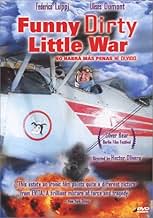Funny Dirty Little War is a movie directed by Héctor Olivera. This film serves as a reflection on the chaotic situation that Argentina went through in the years preceding the so called "Process of national reorganization".
The script is precise and compact; it doesn't waste scenes or characters and tells all it needs to tell in less than eighty minutes. The story takes place in Colonia Vela, a small town in the province Buenos Aires. The year is 1974, at this period of time Peronismo was the dominant political party and dissidents were persecuted. A left-leaning municipal delegate is falsely accused of being a communist and decides to take up arms and control the municipality, helped by a small group of improvised allies, to demand for his innocence. What ensues is a useless and destructive conflict between the Peronist right and left wing that exemplifies the absurd nature of the internal quarrels that wreaked havoc and paved the way for the extreme right dictatorship that would take over the power in Argentina in 1976.
This film doesn't just drive a message, but also showcase Olivera's direction, dynamic and spectacular, but without going over the edge and becoming ridiculous. There are lots of shootouts, explosions and special effects in this production that is both pioneering and superior to the others that Héctor Olivera directed in association with the Northamerican producer Roger Corman in later years (The White Death, from 1985, is a good example).
The script has a good dose of humor that is used to highlight the absurdity of the situation. This humorous tone is backed by the cast, overflowing with talent. All these aspects help to create familiarity and complicity with the spectator, this comfortable atmosphere is violently shattered in the second half of the film, moving the spectator and reinforcing the impact of the message.
In conclusion, Funny Dirty Little War is a great movie that presents a heavy loaded message in a very entertaining package. I highly recommend it for anyone who appreciates good cinema, although I must say that some knowledge of Argentinian history is necessary to understand this movie completely.
This is the translation of a review first published in FilmAffinity, on the 23 of September of 2020. Written by Germán Dawidowski, translated with the help of Paula Marrodan.



































